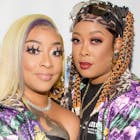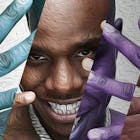She'd broken through majorly in 1996, signed to Teddy Riley's Lil Man production label, she guested on "No Diggity," the massive hit from Riley's R&B quartet BlackSTREET. "No Diggity" shot to No. 1 on the Billboard Hot 100 and received a Grammy nomination for Best R&B Song in 1997. It all set the stage for Queen Pen, who would drop her album My Melody in the fall of 1997, followed by her own massive hit single "A Party Ain't A Party" in early 1998.
It was a busy year for Pen, who'd emerged out of Brooklyn with a brashness and boldness that was perfect for the post-Lil Kim, "Shiny Suit" leanings of the late 1990s. Her rise had been harrowing; she was a single mother who'd been a parent since she was a teen, she'd endured domestic abuse and one of her children's father was Darren "Buff Love" Robinson of the Fat Boys, who'd died of a heart attack in 1995 at the age of 28.
As "A Party Ain't A Party" dominated dance floors, Queen Pen had this other single ready to go. Meshell Ndegeocello had dropped the provocative single "Boyfriend" back in 1993; and Ndegeocello, an openly LGBTQ artist who'd been making waves for years, agreed to guest on Pen's remake/reinterpolation of Meshell's first hit.
There had been rappers who'd alluded to same-sex situations but they'd mostly been women rapping about threesomes and girl-on-girl scenarios that seemed connected to men's sexual fantasies. With "Girlfriend," Queen Pen and Meshell Ndegeocello took things in a completely different direction. This was a woman openly referencing her attraction to another woman and warning any third party that she could have the woman if she so chose.










